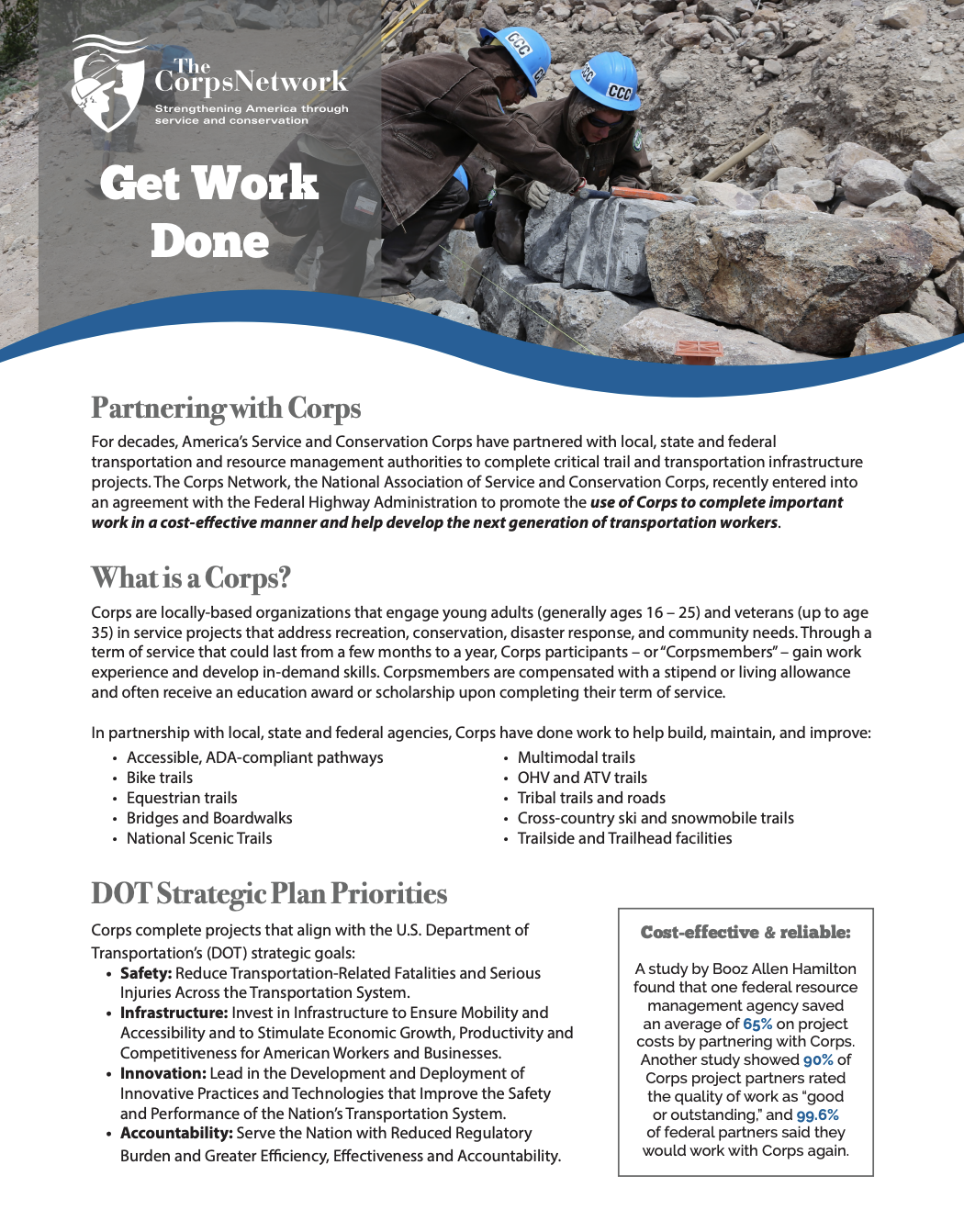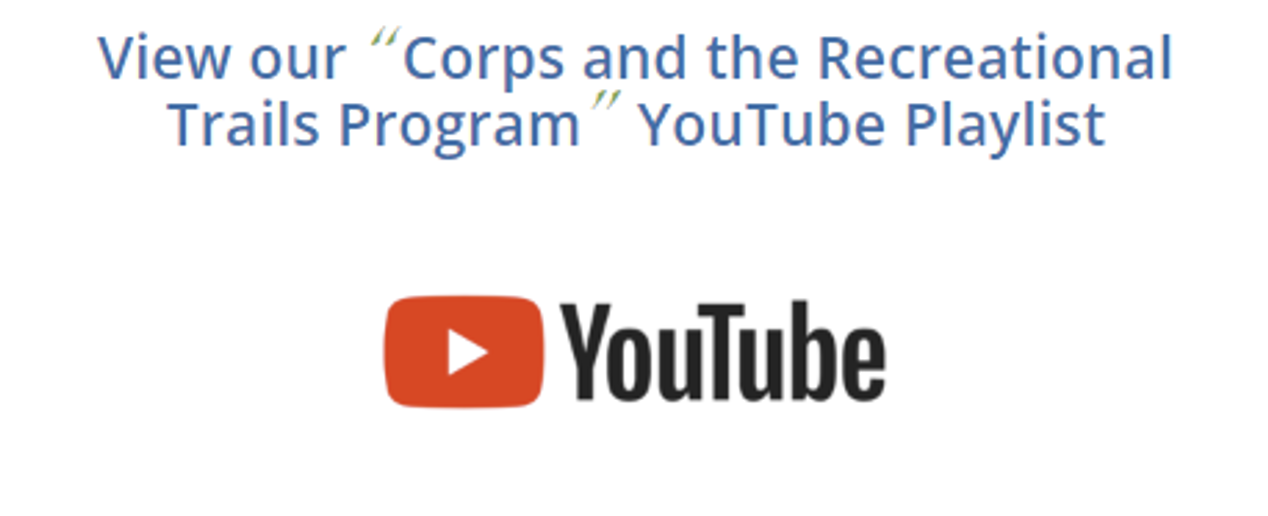Building America’s Infrastructure and Trail and Transportation Professionals
Background
The Corps Network and the Department of Transportation’s Federal Highway Administration (FHWA) are partnering to foster relationships and develop systems and resources that encourage state and regional transportation agencies to work with Service and Conservation Corps. These local and state-level partnerships with Corps help transportation agencies complete critical transportation and recreational trail projects, and also help enhance career pathways for Corpsmembers. Working together, The Corps Network and FHWA are producing toolkits, compiling best practices, and aim to provide training and workshops to support these partnerships.
For years, trail and resource management agencies have partnered with Corps because they are cost-effective partners towards meeting local, state, and federal priorities. Corps can help increase the capacity of trail and resource management staff to focus on other priority areas while completing deferred, backlogged work.
The following are examples of Corps project and workforce development goals that align with many of FHWA’s federal-aid programs.
- Trail maintenance and restoration
- {{content-1}}
- -Trail Resurfacing and Widening
-Retaining Walls and Switchbacks
-Waterbars and Checksteps
-Winter Trails and Snow Removal
-Fire Fuel Reduction
-Vegetation Management
-Irrigation and Drainage Systems
-Tree, Native Planting, and Landscaping
- Trailside and trailhead facilities
- {{content-1}}
- -Trail Bridges and Boardwalks
-Fencing
-Trailhead Parking Lots and Facilities
-Kiosk Installation
-Blazing, Markers, and Trail Signage
-Picnic and Recreation Areas
- Construction of new recreational trails
- {{content-1}}
- -Installation of Accessible, ADA-Compliant Pathways
-Asphalt and Pavement Work
-Tribal Trails and Roads
-OHV and ATV Trails
-Mountain Biking Trails
-Water Trails and Boat Docks
- Assessment of trail conditions
- {{content-1}}
- -GIS Mapping and Trail Surveying
-Database Management and Collection
-Assessment of Trail Features, Conditions and Characteristics
- Safety and environmental education
- {{content-1}}
- -Hiking and Biking Safety Patrols
-Trail Building Tool and Equipment Safety Lessons
-Trailbuilding Instruction
-Chainsaw Training and Certifications
-Volunteer and Community Events
-Preservation of Cultural and Natural History
Trail and Transportation Grant Programs
Service and Conservation Corps complete a variety of recreational trail, infrastructure, provide educational programming, and perform assessment and design work in partnership with their local communities, state and federal programs. Continuing to support Corps can provide additional workforce development and career pathway opportunities for local youth and recent veterans eager to enter into the transportation workforce.
The following are some FHWA’s federal-aid grant programs that Corps are often recipients/subrecipients for:
The Recreational Trails Program (RTP)
RTP is a federal grant program that provides funding for the development, renovation, and maintenance of recreational trails and trailside facilities. FHWA administers this program at the federal level while State trail agencies administer the program.
Who is eligible to apply for RTP Grants?
- Local governments
- Federal Agencies (like the National Park Service)
- Regional transportation authorities
- Natural resource or public land agencies
- Tribal governments
- Nonprofit 501(c) organizations
FHWA – The Recreational Trails Program
FHWA – Youth Service and Conservation Corps Q&A
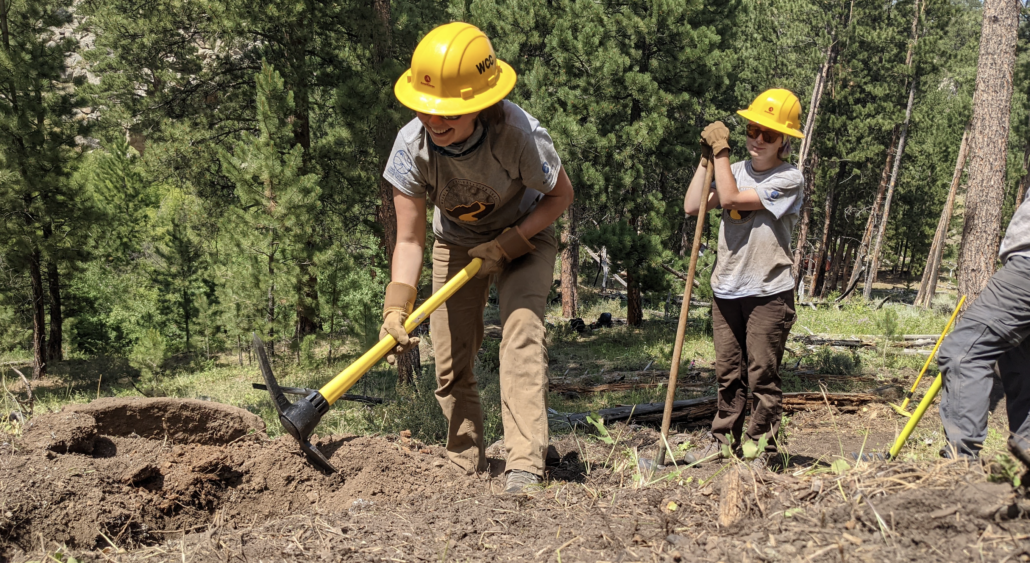
The Wyoming Conservation Corps was a recipient of a Wyoming RTP grant that supported their inaugural 2022 women’s crew at Grand Teton National Park.
The Recreational Trails Program, Safety and Education Grants
The Recreational Trails Program, Safety and Education Grants are limited to 5% of the total RTP allocation for a state trails program per fiscal year. These grants support educational programs that promote safety and environmental protection related to the use of recreational trails.
Eligible projects may include: the development and operation of trail safety programs, the development and operation of trail-related environmental education programs, or the production of trail-related education materials. For Corps, grants can also be awarded for trail building instructors/speaker fees, community programs, training and certifications for Corpsmembers, trail safety patrols, etc.
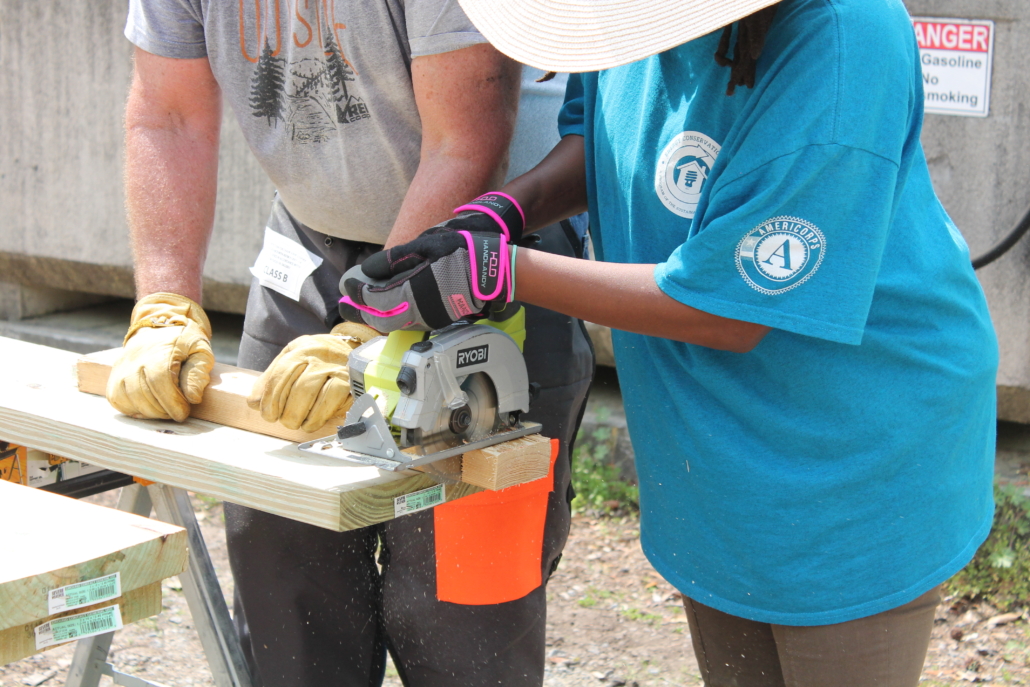
The Sustainability Institute was a recipient of a South Carolina RTP Education and Safety grant between 2021 – 2023 for Corpsmember trailbuilding service-learning projects and instructor fees.
Transportation Alternatives Program (TAP)
TAP funds transportation-related community projects with the goal of expanding travel choice, strengthening the local economy, and protecting the environment by supporting non-traditional projects linked to the transportation system.
Eligible TAP projects should support the following eligible activities:
- Facilities for pedestrians, bicyclists, and other non-motorized forms of transportation
- Safe routes for non-drivers
- Conversion and use of abandoned railroad corridors for trails
- Community improvement activities
- Environmental mitigation or pollution prevention
- Safe Routes to School
- Recreational Trails
DC DOT Transportation Alternatives Program, Summary and Application Guide
Safe Routes to School (SRTS)
SRTS promotes safe community walking and biking through infrastructure improvements and education. SRTS programs can be implemented by a state department of transportation, metropolitan planning organization, local government, school district, or even a school. Service and Conservation
Corps have supported SRTS initiatives through trail and sidewalk projects, bike safety programs, community clean-ups, and volunteer management. Corps can also benefit from local SRTS grants and partnership since it provides access to new partners with shared interests and values, accessing new and flexible funding, identifying educational programs, completing infrastructure work, and creating recruitment pathways.
Corps and School Collaboration: Building Creative Work Partnerships (2023 Webinar)
Resources
State agencies should consider Service and Conservations Corps as a pipeline to diverse and prepared candidates for available and hard-to-fill trail, transportation, and infrastructure jobs. By partnering with Corps, agencies are offering a new generation of young professionals opportunities in the communities where these projects are located. The following are resources that can help build or strengthen relationships with local Corps, provide guidance on Corps contracts and agreements, and other partnership tools.
Our Trails & Transportation Resources Library is where you can find resources and guidance on partnership development, contracting and agreements, multimedia, and presentations.
Across the country, federal, state and local trail and transportation managers partner with Corps to complete important trail infrastructure projects. If your agency is interested in working a Corps, visit our Members by State page to find a qualified Youth Service Corps near you.
Federal legislation encourages State trail agencies to utilize qualified service and conservation Corps in trail and transportation grants and contracts non-competitively. You can visit FHWA’s fact sheet for more information.
Learn more about our Corps trail projects through our video and multimedia library featuring Corpsmember interviews and recorded presentations
Corpsmember Conversations
Produced with support from the Department of Transportation, Federal Highway Administration (FHWA), our guidebook series feature case studies that highlight the unique ways in which local, state, or federal resource managers utilize grant money, fee-for-service contracting, and other diverse funding sources to engage a Corps in a trail or transportation infrastructure project. Specifically, our Affinity Crews and Programs guidebook highlights the work of Corps who develop and manage identity-based programs and discusses the intention and 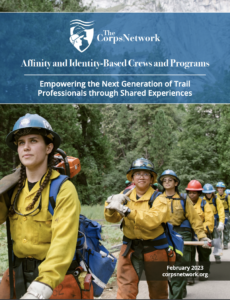 purpose of these crews, why they are important, and how they have been transformational experiences for Corpsmembers and partners.
purpose of these crews, why they are important, and how they have been transformational experiences for Corpsmembers and partners.
What is an Affinity and Identity-Based Program?
Affinity and identity-based crews and programs offer a space where young adults from historically marginalized populations and underrepresented groups can build community, grow, learn, heal, and explore career pathways in conservation while serving alongside peers who share a similar culture and lived experience. Environmental and conservation spaces have been historically inaccessible, systemically marginalizing, and not inclusive or equitable for all populations, particularly people of color. Affinity programs empower young people within a shared, inclusive space that is representative of their identities, and act as a mechanism to help make the public lands and trail industry look more like America.
Below are videos from our resource library that are meant to complement our Affinity guidebook by sharing honest and candid Corpsmember conservations from the field who serve on affinity crews. They share their personal and professional growth, challenges, lessons, and transformational experiences having served on these crews.
Corpsmember Conversations with Jenetta of Eastern Sierra Conservation Corps
Jennetta gives a breakdown of her backpacking trip and what she looks forward to next.
Watch her video to learn more about her highlights and various adventures!
Corpsmember Conversations with Mike of Eastern Sierra Conservation Corps
Mike offers insight on what he finds valuable during his Corps service.
Watch his video to learn more about his highlights and various accomplishments!
Contact:
Lauren Edwards-Johnson
ledwards-johnson@corpsnetwork.org


